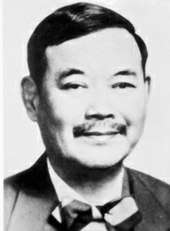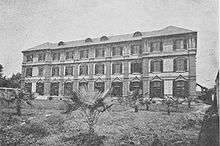Hu Dunfu
Hu Dunfu (Chinese: 胡敦復; Wade–Giles: Hu Tun-fu; 1886 – December 1, 1978) was a Chinese mathematician and pioneer in higher education. He won a Qing government scholarship to study at Cornell University, and became the first dean of Tsinghua University at the age of 25. He was then briefly dean of Fudan University, before establishing Utopia University in 1912 and developing it into one of China's best private universities. He also served as head of the mathematics department of National Chiao Tung University and the first president of the Chinese Mathematical Society, which he co-founded in 1935.

Early life and education
Hu Dunfu was born in 1886 into a prominent family of scholar-officials in Wuxi, Jiangsu Province, a descendant of the Song dynasty scholar and educator Hu Yuan (胡瑗; 993–1059).[1] When he was 11, he was accepted by the elementary school of Nanyang Public School (now Shanghai Jiao Tong University), and later attended its secondary school.[2] When his teacher Ma Xiangbo left Nanyang to establish Aurora University and later Fudan University, Hu, together with Huang Yanpei and others, followed Ma and became the first students at Aurora and then Fudan.[3]
In June 1907, Hu won a government scholarship to study in the United States, and entered Cornell University in September. He earned a bachelor's degree in mathematics in only two years, and returned to China in August 1909.[2]
Career in China
In April 1911, the U.S. government established Tsinghua College in Beijing, using part of the Boxer indemnity payment made by the Qing dynasty.[4] Hu Dunfu was hired as the first dean of Tsinghua, at the age of 25.[2][3] In summer, eleven Tsinghua faculty members established Lida Society to promote education in China, with Hu as its head.[1] In November 1911, during the Xinhai Revolution, the Lida Society members resigned from Tsinghua after disagreements with the college's American administrators, and left Beijing for Shanghai.[5] Hu was hired by Ma Xiangbo as dean of Fudan University, but soon left the school after a student strike.[1]

In March 1912, Hu and his colleagues of Lida Society founded Utopia School in Nanshi, Shanghai, with Hu as its first president.[1][5] Under his leadership, Utopia was certified as a university in 1922, and developed into one of the two most reputable private universities in China, the other being Nankai University in Tianjin.[1][5]
After Hu's friend Li Zhaohuan became the president of National Chiao Tung University (NCTU), he invited Hu to help build NCTU's mathematics program. Hu thus became head of NCTU's mathematics department in 1930.[2] In July 1935, Hu, together with other leading Chinese mathematicians including Feng Zuxun, Xiong Qinglai, Chen Jiangong, and Su Buqing, established the Chinese Mathematical Society at a meeting held in the library of NCTU.[6] Hu served as the first president of the society.[2]
As the Communist Party of China defeated the Kuomintang in the Chinese Civil War, Hu Dunfu followed the retreating Kuomintang government to Taiwan in 1949. The new Communist government of the People's Republic of China closed Utopia along with many other private schools in 1952, and its departments were split up and merged into six public universities in Shanghai.[5] Hu tried to re-establish Utopia University in Taiwan, but was ultimately unsuccessful.[1]
Later life in the United States
Hu later moved to the United States, where he taught at the University of Washington until his retirement in 1962. He died on December 1, 1978 in Seattle, at the age of 92.[2]
References
- Ma Xueqiang (19 November 2012). 中国知识分子创办的大同大学 [Utopia University, established by Chinese intellectuals]. Wen Hui Bao (in Chinese). Retrieved 1 March 2016.
- Zhang Youyu (August 2008). 中国现代数学家传 [Biographies of Modern Chinese Mathematicians] (in Chinese). Jiangsu Education Press. Archived from the original on 2016-03-07. Retrieved 2016-03-05.
- Shi Wen (21 April 2011). 胡敦复:复旦大学的开山弟子 [Hu Dunfu: the first student of Fudan University] (in Chinese). Tsinghua University. Retrieved 3 March 2016.
- Pan, Su-Yan (2009). University Autonomy, the State and Social Change in China. Hong Kong University Press. p. 68. ISBN 978-962-209-936-4.
- Lu Xianliang (17 December 2014). 华理"身世"之脉系:大同大学简介 [History of ECUST: an introduction to Utopia University] (in Chinese). East China University of Science and Technology. Archived from the original on 4 March 2016. Retrieved 3 March 2016.
- "CMS History". Chinese Mathematical Society. Archived from the original on 13 June 2010. Retrieved 3 March 2016.